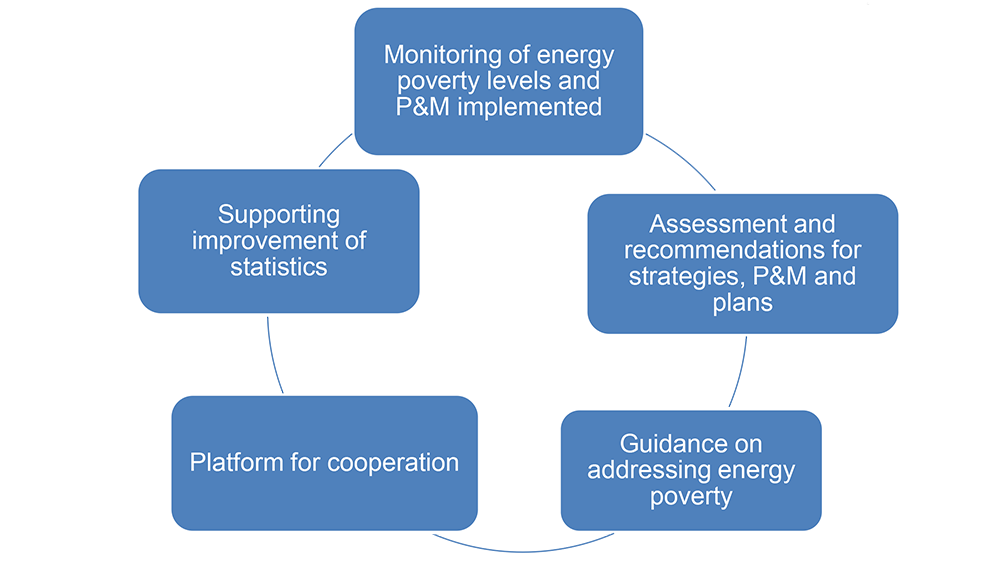Energy Poverty
Centre for Alleviating Energy Poverty
-
Secretariat’s actions
-
Supporting
Centre for Alleviating Energy Poverty Description Recognizing the urgency of energy poverty in the Energy Community Contracting Parties, the Secretariat—through its Centre for Alleviating Energy Poverty—leads efforts in data collection, policy guidance, stakeholder engagement, and regional coordination to support national initiatives and promote knowledge sharing. Purpose - to collect data and information related to the causes and impact of energy poverty in the Energy Community Contracting Parties;
- to promote the development of appropriate policies and measures for reducing energy poverty;
- to provide a platform for discussion among the relevant energy sector stakeholders in the Energy Community.
Policy Guidelines on identifying and addressing energy poverty Description Published in August 2022, the Policy Guidelines on identifying and addressing Energy Poverty in the Energy Community Contracting Parties are designed with a view to assist the Energy Community Contracting Parties in supporting the most vulnerable categories of energy consumers.
Purpose - defining energy poverty indicators at national and local level,
- defining what constitutes a significant number of energy poor households in the Contracting Parties, and
- long- and short-term measures which could be used to address energy poverty, including those covered by the relevant sections of integrated National Energy and Climate Plans
Energy Poverty Fact Sheets Report Description This set of Contracting Party-specific factsheets tracks and compares the implementation of energy poverty legislation, policies, and measures across the Energy Community. Published in October 2024, each factsheet provides structured insights into legal definitions, institutional frameworks, policy tools, and data availability, offering a snapshot of national efforts to address energy poverty. Purpose -
Monitor the status of energy poverty definitions, legal frameworks, and databases.
-
Assess the implementation of short- and long-term measures based on Energy Community guidelines.
-
Summarize national energy poverty policies, coverage, and spending.
-
Review integration of energy poverty into NECPs and Secretariat recommendations.
Report on protection of vulnerable households in the Western Balkans Description This July 2023 report examines both immediate relief measures and structural policies, particularly within the framework of the EU Energy Support Package for the Western Balkans. It distinguishes between general support for all households and targeted aid for those in greatest need, drawing early conclusions about the effectiveness of the interventions and offering policy recommendations aligned with Energy Community legislation. Purpose -
Assess how Western Balkans governments supported vulnerable and energy-poor households during the energy crisis.
-
Review implementation of the EU Energy Support Package and track key planned and completed measures.
-
Highlight the need for balanced short- and long-term policies that protect vulnerable consumers and promote energy savings.
Earlier, in December 2021, the Secretariat published a regional study highlighting energy poverty’s roots in post-communist transition challenges, infrastructure gaps, and socio-economic impacts worsened by COVID-19. This foundational work underpins the Secretariat’s ongoing commitment to making energy poverty a key policy priority.
Document Name Published on All Cats 31.10.202376c4f767753346d0bbb559c9040fbd20
6fb33b42eab94730b03bd3d35ba25b91
c83a11fd5b8b4480acc3888f6770e2c7
d0d33de7464645f29d1e5ae0429ea7d4
b96bfe18c6a74126a3f0268d2d4ec983
9e37aa8146ae42968b5a22420ca9baa2
90d4d4ee62ee47c5ac741c6d749c1967
ac1469acd84744a4ba84302170fac7fa
8a2b21fc24e3464d9023e052978bf728
6bd359baa3f64df48bcb717f5e27e9e8
5a936f61ed4d45f797502ec5fef0c4b4
29.08.20228a2b21fc24e3464d9023e052978bf728
e74fc3d94ab94572b409765e6b268c15
c3dc8aee01884efda84cf1c6e4c21fe9
7fb03090be434d82bb20509fff98eb38
9e37aa8146ae42968b5a22420ca9baa2
76c4f767753346d0bbb559c9040fbd20
c98862db53d5464cbd6f6d577fe480df
06.12.2021b96bfe18c6a74126a3f0268d2d4ec983
c83a11fd5b8b4480acc3888f6770e2c7
012935c4ed2d4a00968c7ed7b9212427
c3dc8aee01884efda84cf1c6e4c21fe9
521170f3d1eb453bb1595068605bbadf
5a936f61ed4d45f797502ec5fef0c4b4
6bd359baa3f64df48bcb717f5e27e9e8
c28d7331c12b4894b89045e26ea1311d
8b6d078fc0b44e1d8e0367520da562ef
d0d33de7464645f29d1e5ae0429ea7d4
c01a179cd9154effa81cb172237a6e3e
946fe3fb9f614848a732bcce618092d1
1926585dc2784850bc6eb9fc7986c0c9
6fb33b42eab94730b03bd3d35ba25b91
8a2b21fc24e3464d9023e052978bf728
f42cd4605d4c46dc8dba5780d2d4f66d
09.10.2024d0d33de7464645f29d1e5ae0429ea7d4
012935c4ed2d4a00968c7ed7b9212427
1926585dc2784850bc6eb9fc7986c0c9
b51dfa4698664773a5fe20a1a3861efe
6bd359baa3f64df48bcb717f5e27e9e8
c83a11fd5b8b4480acc3888f6770e2c7
5a936f61ed4d45f797502ec5fef0c4b4
b2f5d0ef0e8c4cbd9e455ebd161d6f10
c01a179cd9154effa81cb172237a6e3e
6fb33b42eab94730b03bd3d35ba25b91
8a2b21fc24e3464d9023e052978bf728
b96bfe18c6a74126a3f0268d2d4ec983
c28d7331c12b4894b89045e26ea1311d
9e37aa8146ae42968b5a22420ca9baa2
a8447a5032a642a28eeccbffa3ab873c
-
Monitoring
- Monitoring the transposition and implementation of national laws relevant to energy poverty.
- Monitoring energy poverty policies and measures within National Energy and Climate Plans.

-
Supporting
-
Timeline and tasks
Timeline
 Jan 2015
Jan 2015Transposition deadline on definitions and provisions for vulnerable energy consumers (Electricity Directive (EU) 2019/944, the Gas Directive 2009/73/EC).
 Dec 2023
Dec 2023Deadline for establishing and publishing a set of criteria on energy poverty (Electricity Directive 2019/944).
 Dec 2024
Dec 2024Deadline for the first NECPs and indicative objective to reduce energy poverty and outline the policies.
 March 2025 (Biennial thereafter)
March 2025 (Biennial thereafter)Deadline for reporting on Energy Poverty (Article 15) in the context of NECP Progress Reports.
 Jan 2028
Jan 2028Deadline for submitting the second draft NECP and reporting on Energy Poverty.
-
Tasks
All the tasks outlined in the timeline—including legal transposition, reporting, and planning obligations related to energy poverty—fall under the responsibility of the ministry in charge of energy in each Contracting Party.
-
Tasks
-
Legal basis and purpose
Legal basis and purpose
The legal framework for addressing energy poverty in the Energy Community is based on four adapted legal acts: the Electricity Directive (EU) 2019/944, Gas Directive 2009/73/EC, Governance Regulation (EU) 2018/1999, and the Implementing Regulation (EU) 2022/2299 on NECP progress reporting.
- The Electricity and Gas Directives require Contracting Parties to define “vulnerable consumers,” which may include those affected by energy poverty. They also mandate safeguards, such as protection from disconnection and support for energy efficiency improvements, particularly for remote or critically dependent consumers.
- Article 28 of the Electricity Directive broadens the definition of vulnerable consumers, referencing income, energy costs, efficiency, health needs, and age. Article 29 of Directive (EU) 2019/944 requires Contracting Parties to set clear criteria for identifying energy poverty, considering low income, high energy expenditure, and poor energy efficiency.
- Under the Governance Regulation, Contracting Parties must assess energy poverty in their National Energy and Climate Plans (NECPs) and, if significant, set a national objective to reduce it. They must outline policies, including social measures, and report progress with quantitative data and updates on implementation.
- The Implementing Regulation (EU) 2022/2299 provides the framework for structured reporting on energy poverty and just transition in future NECP progress reports, as required under Article 15.

